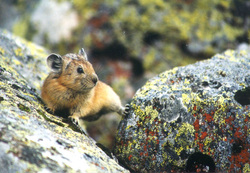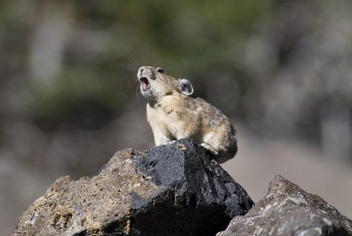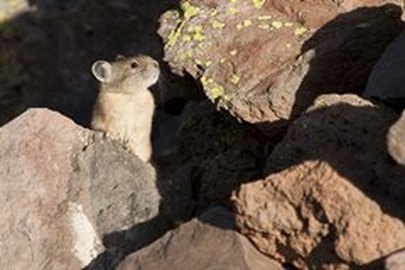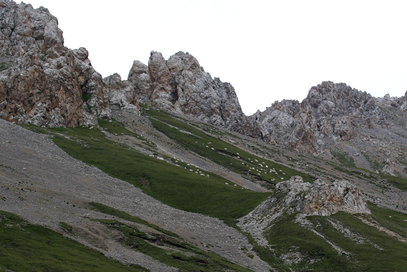Pika Research and Conservation at Craighead Institute
Effects of Climate Change on Pika Populations

Using innovative technology in climate change research
Climate change and its effects on all species may be one of the most difficult challenges to be faced in the twenty-first century. The most notable changes will be felt at high latitudes and at the poles. As humans, we will be able to mitigate some of the climate challenges through migration, innovative technologies and change in political policies. Plant and wildlife species on the other hand will be limited in their ability to withstand climate change. Species will either adapt by migrating latitudinal or altitudinal within their ranges, finding microclimate refugia that are buffered from extremes, or perish.
One species that is threatened by climate change is the pika (Family Ochotonidae). Pikas are highly sensitive to warm temperatures and are physiologically unable to survive if the temperature exceeds a certain threshold. Therefore they serve as excellent indicators of a changing climate. These denizens of high alpine environments are already feeling the heat. Populations are being extirpated in the United States’ Great Basin of Nevada, and in the Tian Shan mountains of China. Evidence suggests that increased temperatures and a changing climate are to blame.
Climate change and its effects on all species may be one of the most difficult challenges to be faced in the twenty-first century. The most notable changes will be felt at high latitudes and at the poles. As humans, we will be able to mitigate some of the climate challenges through migration, innovative technologies and change in political policies. Plant and wildlife species on the other hand will be limited in their ability to withstand climate change. Species will either adapt by migrating latitudinal or altitudinal within their ranges, finding microclimate refugia that are buffered from extremes, or perish.
One species that is threatened by climate change is the pika (Family Ochotonidae). Pikas are highly sensitive to warm temperatures and are physiologically unable to survive if the temperature exceeds a certain threshold. Therefore they serve as excellent indicators of a changing climate. These denizens of high alpine environments are already feeling the heat. Populations are being extirpated in the United States’ Great Basin of Nevada, and in the Tian Shan mountains of China. Evidence suggests that increased temperatures and a changing climate are to blame.
Help Support our Pika Research & Adopt a Pika Today! ►
Suitability Modeling

photo by Becka Barkley
Identifying current habitat and predicting habitat under future climate scenarios is one important area of research. One of the most effective tools for this is habitat suitability modeling. For this project, pika habitat suitability models are being developed in a Geographic Information System (GIS) using population data from three distinct populations of pikas in three different ecoregions around the world.
Using temperature and precipitation predictions from climate change (CC) models, the habitat suitability models will help explain if pika populations in other parts of Montana and the U.S. will decline in the future under similar climate factors and develop future scenarios to predict when and where those changes may occur. Now and in the future, managers and conservation groups are going to need innovative technology and research, like that being developed through this project, to guide conservation efforts for imperiled species such as pikas.
Using temperature and precipitation predictions from climate change (CC) models, the habitat suitability models will help explain if pika populations in other parts of Montana and the U.S. will decline in the future under similar climate factors and develop future scenarios to predict when and where those changes may occur. Now and in the future, managers and conservation groups are going to need innovative technology and research, like that being developed through this project, to guide conservation efforts for imperiled species such as pikas.
Pika Survey
Thanks in large part to the following organizations, foundations, and individuals who have supported our pika research programs:
 April Craighead presenting to a sold-out REI workshop
Alcoa Foundation
Charlotte Martin Foundation The Cinnabar Foundation The Harris Foundation The Hudoff Families The Mountaineers Foundation Montana Audubon Society Montana Import Group Northwestern Energy REI Bozeman |


